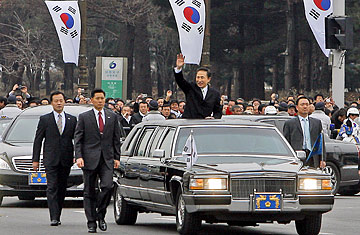
South Korea's new President Lee Myung-Bak after his inauguration ceremony in Seoul on Feb. 25
Lee Myung Bak, former CEO of Hyundai Engineering and Construction, one of South Korea's largest construction companies, has built everything from churches in his homeland to roads in Thailand. After being sworn in Monday as South Korea's new President, he's about to undertake another big job: shoring up the country's economy.
Lee, 66, recognizes the challenges ahead. During his inauguration speech, the man nicknamed "The Bulldozer" said, "Economic revival is our most urgent task." After recording GDP growth of 5% last year — somewhat tepid by Korean standards — forecasts for 2008 call for the country's 2008 GDP growth to decline to around 4% as the U.S. battles a recession and demand for Korean exports eases globally. In February South Korea is expected to post its third straight monthly trade deficit — the first time that's happened in more than five years — as high oil prices and declining exports continue to bite. "The external environment helped the two previous Presidents," says Kim Kyeong Won, an economist and senior vice president of the Samsung Economic Research Institute (SERI), "but it won't be working as good for President Lee."
Lee may have several factors in his favor, however. While South Korea's last two Presidents were well-known pro-Democracy activists before they moved into the Blue House, Lee is a conservative businessman: he's the country's first CEO commander-in-chief. While he was mayor of Seoul, Lee became known for thinking big. One of his celebrated projects was the removal of an espressway that ran through the heart of the capital in order to restore a six-mile-long stream. He has a more ambitious vision for the country. Lee says he wants to put in place programs that will create three million jobs over his five-term in office, as well as return Korea to 7% annual growth and put in place programs to double annual average per capita income to $40,000 over the next decade. His to-do list also includes cutting corporate and property taxes, reducing business regulations, shrinking the size of government and luring more foreign investment. Even before taking office, he announced plans to eliminate a handful of ministries, including the Ministry of Unification, which oversees relations with North Korea; reform the university entrance system; and strengthen English language education in public schools to increase the country's global competitiveness.
He's also championing a massive public works project — the planned Grand Korean Waterway, a controversial 336-mile canal that would link the country's industrial northwest to the southeast city of Busan, south Korea's largest port. The government says the canel will attract tourists, provide cheaper freight transport and stimulate economic development in the interior. Environmental groups and opposition politicians are calling the project a boondoggle, although Lee insists the $16 billion project can be privately funded so that taxpayers won't have to pick up the tab. "Obviously, [the canal] would help the economy," in part because it would employ tens of thousands of construction workers, says Kim of SERI. But "no one is sure about its profitability," he adds.
Even if he wins support for the canal, other Lee initiatives could bog down. South Korea's notoriously prickly labor unions are vehemently against ratification of a free-trade agreement with the U.S. signed last year; Lee, who unlike his predecessor Roh Moo Hyun is unabashedly pro-America, says the agreement would increase trade. He also supports ongoing efforts to privatize the energy sector and railroads, which union members have vowed to fight. "We don't agree with the policies of the new government," says Lee Chang Geun, the international executive director of the Korea Confederation of Trade Unions. "It will be an all-out struggle."
Whether Lee wins that and other struggles may depend largely on national assembly elections in April. Currently, the country's parliament is dominated by liberal opposition politicians who can block Lee's reform efforts. But many observers think Lee's conservative Grand National Party stands a good chance of picking up enough seats to control the assembly, citing as evidence the outcome of December's elections in which many liberal candidates were defeated. Says Cheong Inkyo, an economics professor at INHA University in Incheon: "The people have already indicated they want a change." South Korea's first CEO President says he'll deliver it.
